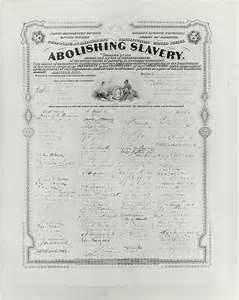The Thirteenth Amendment
The Thirteenth Amendment abolished slavery. The passage of this amendment wasn't a foregone conclusion, though. The first ten Amendments, the Bill of Rights, came into being as a group, in 1791. Two more Amendments followed, the 12th coming in 1804. Some lawmakers, including John Quincy Adams in 1839, had introduced bills calling for abolition of slavery. But the approach to the slavery issue had been one of compromise, of sustaining it, of containing it. Not until the Civil War began and President Abraham Lincoln issued the Emancipation Proclamation did abolition as a legal issue accelerate. The first serious mention of a constitutional amendment outlawing slavery came in 1863. On December 14, James Ashley (R-Ohio) introduced a slavery prohibition bill in the House. Other lawmakers had introduced similar bills in the past, but Ashley's was the first bill to get a lot of interest. A similar bill, from Rep. James Wilson (R-Iowa), followed. The first such bill from a Democratic lawmaker came on January 11, 1864, from Senator John Henderson (D-Mo). The Republican Party at this time was largely a party of abolition. A large part of the Democratic Party had historically embraced the right to own slaves.
The proposed amendment then went to the state legislatures. Northern states quickly ratified the proposed amendment, beginning with Illinois a day after the House approved and carrying on through Massachusetts a week later. Virginia, the first Southern to ratify the amendment, gave its approval on February 9. Other states, North and South, gave their approval as well. When Georgia became the 27th states to approve, on Dec. 6, 1865, the amendment became law. Secretary of State William Seward proclaimed it the law of the land on December 18. Section 1. Neither slavery nor involuntary servitude, except as a punishment for crime whereof the party shall have been duly convicted, shall exist within the United States, or any place subject to their jurisdiction. |
|
Social Studies for Kids
copyright 2002–2026
David White

 With bills in the House and Senate, the Senate Judiciary Committee took up the discussion, augmented by another Senate bill, this one from Charles Sumner (R-Mass), who also called for equal protection under the law to accompany the abolition of slavery. Support grew in both houses of Congress, and the Senate Judiciary Committee recommended to the full Senate and the House a bill that combined parts of the proposals of all previous bills. The first House vote on the bill, which took place on Feb. 15, 1864, did not garner enough votes for passage. Even though the vote was 78-62 in favor, the total of 78 was below the two-thirds needed for passage. Two months later, the Senate did pass the bill, 38-6. With the Senate passage secure, proponents of the amendment went back to work on the House, which eventually passed the bill 119-56, on Jan. 31, 1865.
With bills in the House and Senate, the Senate Judiciary Committee took up the discussion, augmented by another Senate bill, this one from Charles Sumner (R-Mass), who also called for equal protection under the law to accompany the abolition of slavery. Support grew in both houses of Congress, and the Senate Judiciary Committee recommended to the full Senate and the House a bill that combined parts of the proposals of all previous bills. The first House vote on the bill, which took place on Feb. 15, 1864, did not garner enough votes for passage. Even though the vote was 78-62 in favor, the total of 78 was below the two-thirds needed for passage. Two months later, the Senate did pass the bill, 38-6. With the Senate passage secure, proponents of the amendment went back to work on the House, which eventually passed the bill 119-56, on Jan. 31, 1865.
